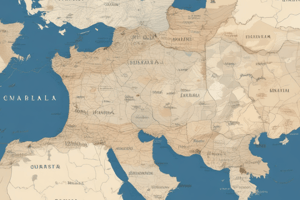Podcast
Questions and Answers
Which geographical feature is NOT characteristic of Turkey?
Which geographical feature is NOT characteristic of Turkey?
- Plateaus
- Mountain ranges
- Coastal plains
- Deserts (correct)
Which event marked the transition from the Ottoman Empire to modern Turkey?
Which event marked the transition from the Ottoman Empire to modern Turkey?
- The collapse of the Roman Empire
- The establishment of the Republic of Turkey in 1923 (correct)
- The fall of Constantinople
- The signing of the Treaty of Sèvres
What is a significant characteristic of Turkey's economy?
What is a significant characteristic of Turkey's economy?
- It relies solely on agriculture
- It has no involvement in international trade
- It is primarily based on mining
- It encompasses both large-scale and small-scale businesses (correct)
Which statement about Turkey's political system is true?
Which statement about Turkey's political system is true?
Which of the following is NOT a major city in Turkey?
Which of the following is NOT a major city in Turkey?
Which leader is known for founding the Republic of Turkey?
Which leader is known for founding the Republic of Turkey?
What is a prominent aspect of Turkey's cultural identity?
What is a prominent aspect of Turkey's cultural identity?
Which conflict does Turkey have a complex relationship with?
Which conflict does Turkey have a complex relationship with?
Flashcards
Turkey's Geography
Turkey's Geography
Turkey is a transcontinental country in Eurasia, with diverse landscapes including mountains, plains, and coastlines on the Black, Aegean, and Mediterranean Seas.
Ottoman Empire
Ottoman Empire
A powerful empire in the Middle Ages and early modern times, centered in Istanbul, which significantly shaped Turkey's history.
Republic of Turkey
Republic of Turkey
The modern Turkish state, established in 1923 after the collapse of the Ottoman Empire.
Atatürk's Role
Atatürk's Role
Signup and view all the flashcards
Turkish Economy
Turkish Economy
Signup and view all the flashcards
Turkish Political System
Turkish Political System
Signup and view all the flashcards
Turkish Culture
Turkish Culture
Signup and view all the flashcards
Turkish Population
Turkish Population
Signup and view all the flashcards
Study Notes
Geography and Demographics
- Turkey is a transcontinental country, straddling Europe and Asia.
- Its diverse geography includes mountain ranges, coastal plains, and plateaus.
- Turkey has significant coastlines on the Black Sea, Aegean Sea, and Mediterranean Sea.
- Turkey's population is approximately 85 million.
- The majority are Turkish, with significant Kurdish minority populations.
- Key cities include Istanbul, Ankara, Izmir, and Antalya.
History
- Turkey boasts a rich, complex history, with various civilizations inhabiting the region for millennia.
- The Ottoman Empire was a powerful force in the Middle Ages and early modern eras, centered in Istanbul.
- The Ottoman Empire's decline and collapse led to the 1923 establishment of the Republic of Turkey.
- Mustafa Kemal Atatürk was crucial in founding the republic and implementing modernizing reforms.
- Modern Turkey has experienced periods of economic growth and political transformation.
Economy
- Turkey's economy is a substantial player in the Middle East and Europe.
- Key sectors are tourism, agriculture, and manufacturing.
- Turkey employs various economic strategies to address challenges and capitalize on opportunities.
- Trade with European nations is substantial, and Turkey participates in international bodies like the WTO.
- Turkey's economy features large and small businesses, experiencing periods of growth and stagnation.
Politics and Government
- Turkey has a multi-party political system.
- Turkey's government is structured with a President and a Parliament.
- Turkey's political landscape has fluctuated between stability and instability.
- Complex relationships with neighboring countries, containing historic and contemporary conflicts, influence Turkey's political situation.
- Contending political viewpoints, opinions and agendas shape Turkey's direction.
Culture and Society
- Turkey's culture embodies a unique blend of Eastern and Western influences.
- Traditional customs and practices remain prominent alongside modern trends.
- Turkey is renowned for its historical architecture, including mosques, palaces, and fortifications.
- Turkey's vibrant arts and culture encompass literature, music, and visual arts.
- Turkey's diversified social fabric incorporates various linguistic and ethnic groups.
Current Challenges
- Turkey confronts economic uncertainty, geopolitical tensions, and social divisions.
- Complex relationships with neighboring countries exacerbate these difficulties.
- Natural disasters and climate change threaten Turkey's infrastructure.
Studying That Suits You
Use AI to generate personalized quizzes and flashcards to suit your learning preferences.




